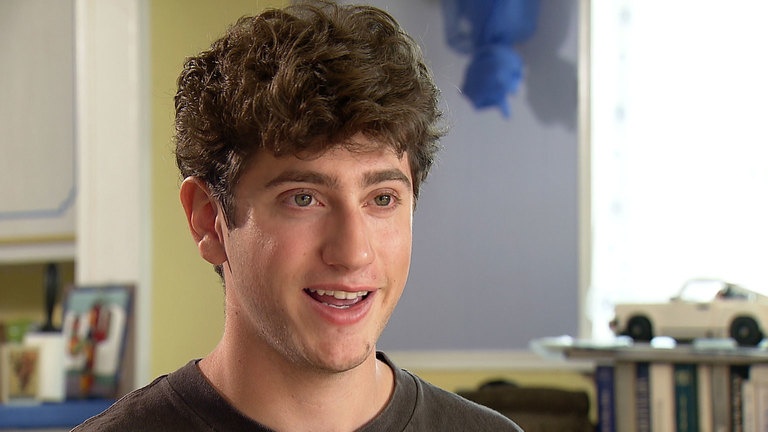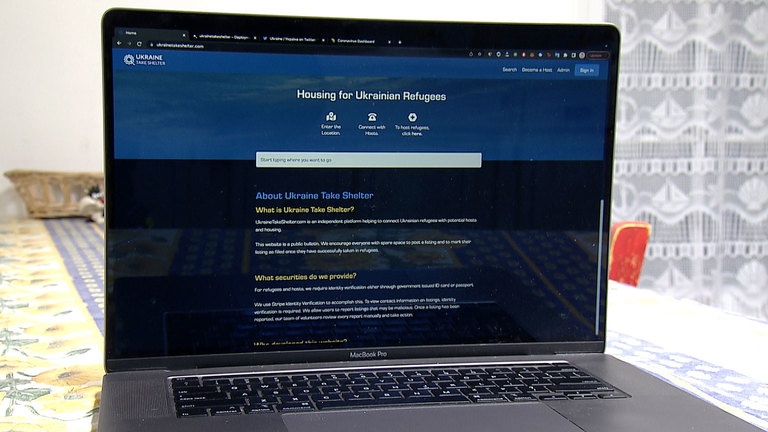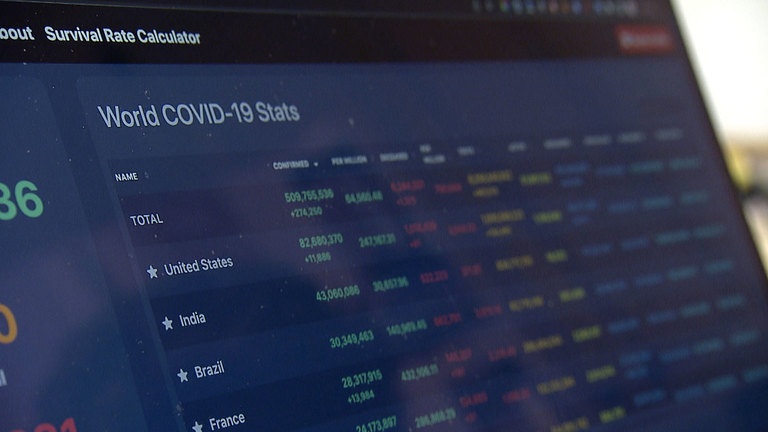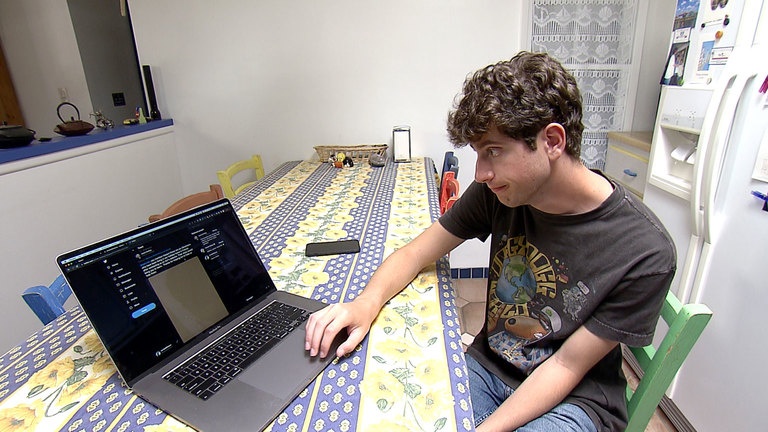A Gen Z Response to Global Problems: Avi Schiffmann / Internet Activist
Generation Z computer wiz Avi Schiffmann uses his coding skills to confront global crises, with websites tracking the coronavirus outbreak and connecting Ukrainian refugees with temporary housing.

Avi Schiffmann, a self-taught web developer, made a website, Ukraine Take Shelter, so that Ukrainian refugees can directly contact those who can offer free temporary housing.

ukrainetakeshelter.com can be accessed via any device connected to the Internet. Most refugees use smartphones when looking for housing.

Schiffmann also created nCoV2019, the worldwide coronavirus tracker, in January 2020. It became the most accessed coronavirus tracker globally.

Schiffmann receives messages of gratitude every day from the Ukrainian refugees and hosts from all over the world.
Transcript
Direct Talk
Since the beginning of the
Russian invasion of Ukraine in February 2022,
more than 5 million people
have fled the war-torn country.
Across the globe, with help from
his classmate at Harvard University,
Avi Schiffmann,
a 19-year-old self-taught web developer
responded by creating a website
to assist refugees.
The site, Ukraine Take Shelter,
connects refugees to people around the world
who are offering temporary housing for free.
Since going viral on social media,
the site has provided a safe place
to stay to thousands of refugees.
By making websites, I'm able to develop,
like, specific, unique, practical tools
that are directly useful and impactful.
I think that's really cool.
And I think we're barely scratching
the surface of what you can do with this,
and I'm hoping to expand what I'm doing into
doing the most interesting
Internet activism stuff
that really anyone has ever done.
I mean I truly think, like,
this kind of activism is going be like
the biggest kind of activism
anyone has ever done before.
We ask Avi Schiffmann
about how the digital natives of generation Z
are using Internet activism
to solve problems globally.
A Gen Z Response to Global Problems
Well, I came up with the idea for
that website when I was here in San Diego,
visiting a friend, I guess
it was a few months ago by now.
They took me to a protest,
I've never actually
even been to a protest before,
but it was in solidarity
with the war in Ukraine,
there were a few hundred people there,
they were all holding up signs.
There were a few Ukrainians speaking,
and it was great, for like
the few hundred people in San Diego.
But I knew that I had this
big public platform as an Internet activist,
and I have all these skills
to make websites and apps,
and all that kind of stuff with technology,
so I felt that
I should really be doing something here
with my skills for
hundreds of millions of people.
So, I went back home and
I looked into what was happening,
and I saw that there were millions
of refugees flooding out of Ukraine
into neighboring countries
and the entire world, but,
and that this was the biggest refugee crisis
in Europe since World War 2.
But the systems in place there
for refugees to find housing,
transportation, food, jobs, etc.
was just absolutely not going
to scale to millions of refugees.
So, I was like,
"Wow okay, someone should really do that."
And actually, I was like, you know,
I was distracted, I was doing
other things around that time,
and, my mind was not really in the place
to be working on like, a website like this.
So, I tweeted, like in my pajamas,
I was like all in bed, curled up,
and I was just on my phone, and I tweeted
"Someone should make a website
to help Ukrainian refugees to find
potential housing in neighboring countries."
And that tweet instantly
starting gaining a lot of traction.
There were hundreds of people saying,
"Wow, what a great idea,
you know, you should do this."
"You're like the perfect person to do this."
And I was like "Huh, maybe, I guess so."
So, I immediately got out of bed,
and I opened up my laptop,
and I just did not move for like 3 days.
Like I finished the website in under 72 hours,
and then I finished about 90% of it in 24,
it was really the extra 2 days
I spent making sure that
it was safe and secure and
professional-looking, all that kind of stuff.
Schiffmann's website,
Ukraine Take Shelter,
is available in 12 languages,
and can be accessed from any device
connected to the Internet.
Refugees Input their location
and the number of people in their family,
and are soon provided
with a list of hosts to contact.
When it first launched,
the number of listings doubled every 12 hours,
and the site reached over
1 million active users in just two weeks.
Well, Ukraine Take Shelter
has been super popular
because it's so easy to use
for both the host and the refugee side.
There's a lot of these NGOs and government
things out there,
that are trying to do these things,
like there is the Red Cross, and
UNHCR, and all these things.
These are great organizations when
there's maybe like 50,000 refugees.
Okay, but there's like, over 5 million now,
and this is the biggest refugee crisis
since World War 2 in Europe,
it's a very big deal.
And they are just, they've been
overwhelmed since day one here, okay.
So, it's great to be able to work
in tandem with these organizations
and provide, like, maybe a way,
quicker way to do these things.
And It's been cool, and
it hasn't really been possible before.
Like I was saying, I mean,
smartphones didn't even exist 15 years ago.
So, a website like this
has only been possible only recently.
And I think in that way,
it's absolutely a game-changer
because it really puts the power
back into the hands of the refugee,
where they're not able to feel so helpless,
you know, that you contact
you're one of the millions of refugees
waiting in line in the Polish train station,
that's great.
That can take weeks, or you freeze to death
on some curb in Eastern Europe in the wintertime,
it's not, it's not ideal.
But through the Internet,
and through websites like this,
they're able to, like, enter where they are,
or where they're headed,
and find, you know,
we have over 100,000 hosts now,
from all over the world.
Everywhere from Israel,
Australia, New Zealand, Paris,
I can name everywhere.
We've had listings filled in almost
every single country in the entire world,
including Russia,
and that's pretty cool.
In the early days of the website
some experts pointed out
weaknesses in its security.
Schiffmann was able to
respond nimbly with additions
such as identity verification
for hosts and refugees
and features to counter spam and bots.
There's all kinds of criticisms
that people have
when you're doing
something so big like this.
But I have absolutely listened to
anyone that has criticisms,
and I've worked very closely
with dozens of aid organizations
that are on the ground in Poland,
Germany, Moldova, etc.
I've worked very closely with them
since the start of this website,
and really tailored it,
and taken their feedback,
and I can code something
on the website right now,
and it'll be live on the website instantly.
And that, you know,
removes a lot of the bureaucracy of working
with some of these other giant non-profits,
because I'm able to do things just like that.
The website has evolved over time,
to continue to be just more secure,
more safe, more useful,
better user interface,
better user experience,
all these kinds of things.
And I've been working with everyone.
I had, like, this user experience
research team in Ukraine,
where they had a bunch of Ukrainians
use the website, in Ukrainian,
and find any potential errors,
or bugs, or any inconveniences,
and, you know, find those,
and make the website better over time,
and it's been cool.
Avi Schiffmann looks like
your typical teenager,
building sci-fi models in his spare time
But he started coding
when he was just seven years old,
picking up skills by watching YouTube videos.
I just like making things,
and I'm pretty good with computers,
I've had a computer when I was very young.
My dad was like
very into coding and computer stuff,
so, when I was, like,
in early elementary school,
I knew how to use a computer
far better than most adults
and I was already making websites.
And everything I've learned, I taught myself
entirely just by watching YouTube videos,
they are entirely free.
I never paid for any boot camp or
college course or anything like that.
The Internet is incredible.
I think it's the coolest thing
humanities have ever done, it's incredible,
connecting everything.
It's awesome.
By middle school,
Schiffmann had created numerous websites
and was selling video games
that he had coded.
But he had trouble getting good grades.
I'm a terrible student,
I dropped out of high school, actually.
I'm a terrible student in the way
that I was never focused on my schoolwork.
I was, I don't know, I mean,
I was a very weird student.
I got like a C minus in physics class,
or, and like a D in biology,
but like, I won my school science fair
for a physics-based project on,
like, using, I made some,
like, theoretical AI,
like, model for predicting the, like,
orbits of space debris,
or something like that,
it was pretty cool.
Like I've done all kinds of things like that,
but at the same time,
I'm like failing my physics classes.
I got, like, 2 on AP Computer Science,
for example.
I was...
yeah, I mean, I dropped out of high school.
In January 2020, Schiffmann made
his mark as an Internet activist
by creating the website, nCoV2019.live.
The site tracks
covid cases worldwide in real time
by gathering information from
hundreds of government and news websites.
It became the most accessed
covid tracker globally,
gaining, at its peak,
36 million visitors in a single day.
Schiffmann received
an offer of 8 million dollars
to place advertising on the website,
but he turned it down.
Later that year, he won the
Person of the Year award at the Webby Awards,
which is considered
the Oscars of the Internet.
I don't really want to be a profiteer.
This is a website about
people dying and stuff,
I don't really need to be
making millions of dollars.
I don't want to ruin my websites filled with
advertisements when they don't need it,
it'd be cheap and lame.
I don't want to fill my site
with political biases,
I don't want to make it take longer to load.
It's ugly, and everyone hates ads,
and I made the website in the first place
because there were these news article
websites that were filled with ads,
and it's annoying.
I have no care about turning down
millions of dollars then because
I could turn down 8 million
to make 8 billion eventually.
I would not have won awards
like the Webby Awards
if my website was filled, I mean, ok,
that award is for the best website
on the internet of the entire year.
They're not going to give that award
to a badly-designed website filled with ads,
they're just not, that'd be stupid.
And winning awards like that
helps my reputation in so many more things,
far more than
anything you can buy with money.
And I know so many people,
and I've been working on so many things
that you know if I ever need
millions of dollars
to work on some random idea I have,
I can just ask for it.
In 2021, Schiffmann got
his high school equivalency diploma,
and was accepted to Harvard University.
But he finds solving real life problems
more interesting than
taking classes at college.
Since he created his website
Ukraine Take Shelter,
refugees and hosts have sent him
messages of gratitude daily,
from around the world.
Like this is the
government of Ukraine on Twitter.
I mean, that's literally Ukraine, so,
it's pretty cool.
I think it's just cool
what you can do with the Internet.
I think it inspires me
to do more of these projects,
and a lot of the stories I get
are pretty crazy,
I mean I'm still very,
I'm genuinely still...
like, it's cool to see
that it actually works.
You know, it's one thing
to code something on your computer,
and then another thing
to get an email, of like...
I've seen, like, these emails I get,
it's like a whole family, like 6 of them,
that are like smiling,
they're holding their kids, their pets,
and their staying at this home
of this person in, like,
the United States, or France,
or Poland, Germany, etc.
I think one of the most notable stories -
there was this family, early on into the war,
that was hiding in Kharkiv,
which is the second-largest city in Ukraine
and was being besieged by Russian troops.
This family was hiding in their basement,
or it was like a cellar.
So, they were hiding there while their city
was being besieged by Russian troops,
and they were able to use
UkraineTake Shelter just on their phone,
to find a host in France
that was able to help them come to France
and stay in their extra holiday home
in the French countryside on the beach.
And three days after this family arrived,
their house in Ukraine
was destroyed by Russian bombs.
So, the website worked just like that,
super fast,
and there's nothing else
out there on the Internet
that would have allowed them to, you know,
just, get such quick, safe sanctuary.
I mean, they would've been killed
if they hadn't been able to use this website.
So, getting emails like that,
it's, yeah, I think it's cool.
It keeps me motivated
to keep working on this website,
because don't get me wrong,
it's very stressful,
I'm only 19,
and this is one of the
biggest websites on the Internet,
and so many people are using it,
and there are so many eyes on it
from the media like this,to governments
to all kinds of things,
and at the end of the day,
I'm just a teenager, too, sometimes.
Schiffmann has put
his Harvard education on hold
to further his Internet activism.
He thinks the possibilities are endless.
I'm adding more things.
I'm working on adding, like,
a lot more updates to the Ukrainian site,
like I want to have refugees find jobs,
transportation, etc., all these things.
I want this Ukrainian site
to turn into something
a lot more than
just something for just Ukrainians.
And if I could have a database,
where you have people offering housing,
people offering translation skills,
people offering transportation,
food, all kinds of resources,
just in general, it would be
an incredible humanitarian resource
for every future war,
natural disaster, pandemic, etc.
The next time there is something happening
that I see there is a gap
that needs to be filled with technology,
I'd be the first one there.
We ask Avi Schiffmann
for a favorite phrase that
guides him in continuing his work.
"The concept of progress acts
as a protective mechanism
to shield us from the terrors of the future."
It's a quote from Dune, the sci-fi book.
This quote just means
kind of like what I'm doing in a way.
The idea that we can make things better
is kind of like a protective mechanism
against bad things
that can happen in the future.
There is the war happening in Ukraine,
but the idea that I can make a website
that can make things better
I guess does protect us in some ways
from bad things that can happen one day,
like the war getting worse
or things like that.
"The concept of progress acts as a protective mechanism
to shield us from the terrors of the future."